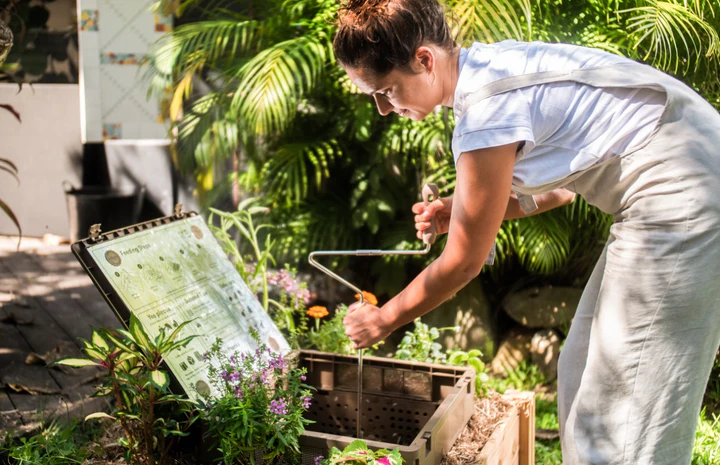Can you imagine a world where all your needs could be met outside the confines of capitalism? No more shame for having too little or even too much money. No pressure to demonstrate your love or gratitude for someone by buying them things. Rather, a shift to engagement, to showing up, to lighting yourself and others up instead of a $28 strand of lights.
This idea is captured in “degrowth.” At its core, degrowth simply means to stop growing. But this notion is radical in the west, and now in parts of the developing world, where the vitality and health of society are predicated on production and output. Degrowth is one model that could help us move beyond capitalism and reorder society so it centers on humanity and breaks away from hegemony and hierarchy.
Looking at degrowth through the lens of holidays needn’t negate the richness of culture and customs celebrated around the world. Rather, it can shift our thinking away from commodification and toward deeper meaning.
What does degrowth look like in practice?
On a macro level, degrowth can fundamentally transform society. But it’s also a powerful tool we can use to live outside the current system and create a revolution within it. You can see degrowth in “Buy Nothing” groups cropping up across cities, people adopting zero-waste lifestyles, and the growth and sophistication of clothing swaps.
As the barrage of Black Friday/Cyber Monday emails and the general ennui of holiday gifting begins, I challenge you to explore what degrowth could mean for you this season. It can be as simple as talking to your family and friends about degrowth or exploring ways to minimize purchases together.
Furthermore, embracing degrowth doesn’t mean you have to give up stuff you love or become a minimalist. It just means finding other ways to obtain the things you love and need, like buying from small businesses in your community, secondhand and vintage stores, or more ethical brands.
If you give an alternative gift and someone gives you a hard time, tell them that it gives the planet, and the people in it, a fighting chance. I can’t think of a better present than that, can you?
Need a little nudge to get started? Here’s a degrowth-approved gift guide.
For the eco anxious
- Pay for their therapy. The decision should be theirs on the course of action and treatment. If they do ask for your advice, some evidence supports that somatic therapies, which connect deeper into the body, are particularly effective for eco-anxiety.
- Books. Intersectional Environmentalist, Inflamed, and Turn the Tide on Climate Anxiety all explore eco-anxiety as it relates to human health and the environment in some capacities. They will also empower your loved one with new knowledge and coping skills.
- A zero-waste gift card. See if there’s a zero-waste grocery shop or subscription delivery service in their area. In Austin, we have Trashless.
For the new homeowner
- A home energy audit. Most cities and private companies offer these. They cost between $200-700 depending on the house size and will give your loved one actionable recommendations to lower their footprint.
- Fund solar panels. Not only will it reduce their impact but they could save a ton on their taxes. This isn’t a gift to surprise them with, however, since you’ll need to see if they have the capacity to support the project and have done your homework checking the federal and state requirements.
- A recycling subscription. We know recycling doesn’t always work (especially plastic). Do some research in their zip code and see if there’s a doorstep recycling program like Ridwell to take hard-to-recycle items like plastic film and clothing.
For the adventurer
- Anker PowerPort Solar Charger. So they can harness the energy from the sun to charge their gear anywhere.
- Scribed subscription. I use and love this audiobook and digital service as an alternative to Amazon. It doesn’t always have just-out books, but it’s got the essentials plus loads of PDF summaries and magazines. To support a degrowth journey, send them Donut Economics or The Uninhabitable Earth.
- A G Adventure. If you have the funds to go all out and want to actually get them an adventure, I recommend this company, which prioritizes small group travel and supports local communities.

For the green thumb
- A subpod. This multitasking vermicompost and raised bed will have them growing their own food by spring. Or better yet, build one for them yourself.
- A DIY pollinator pond. You can make this cheaply with stuff you find at a local thriftstore. Try this or this or if you’ve got the go big or go home mentality you can build a bee hotel (these range from a hanging tin can to a full-blow brick and mortar build).
- A donation to the bee conservancy. Bees are vital and under threat. Nuff said.
For the business traveler
- Joro carbon offsets. I won’t get into the complexity and efficacy of carbon offsets in this guide other than to say that they should not be a replacement for changing habits and society. But if travel is required, Joro offers some of the better offset projects on the market. The app allows you to track your carbon footprint based on spending and then offset (just make sure their company card is linked before you buy credits).
- Scrubba Wash Bag. Prevent them from sending their clothes away at the hotel where toxic chemicals are used with this handy bag (also good for the adventurer on your list).
- A Stojo collapsible coffee mug. Most people have a reusable water bottle by now. Have they replaced their coffee cup yet? It’s hard not to with this packable version.
For the beauty lover
- A zero-waste lipstick. Pretty much anything from Axiology’s lineup should do the trick.
- A refillable beauty staple. I’m into Bite deodorant (which smells like perfume), La Bouche Rouge red lipstick, and this cult face rescue spray by Tower 28.
- A plant-based beauty book. So they can learn how to whip up their own concoctions (or just navigate a label better).
Have another gift idea? Drop it in the comments.




